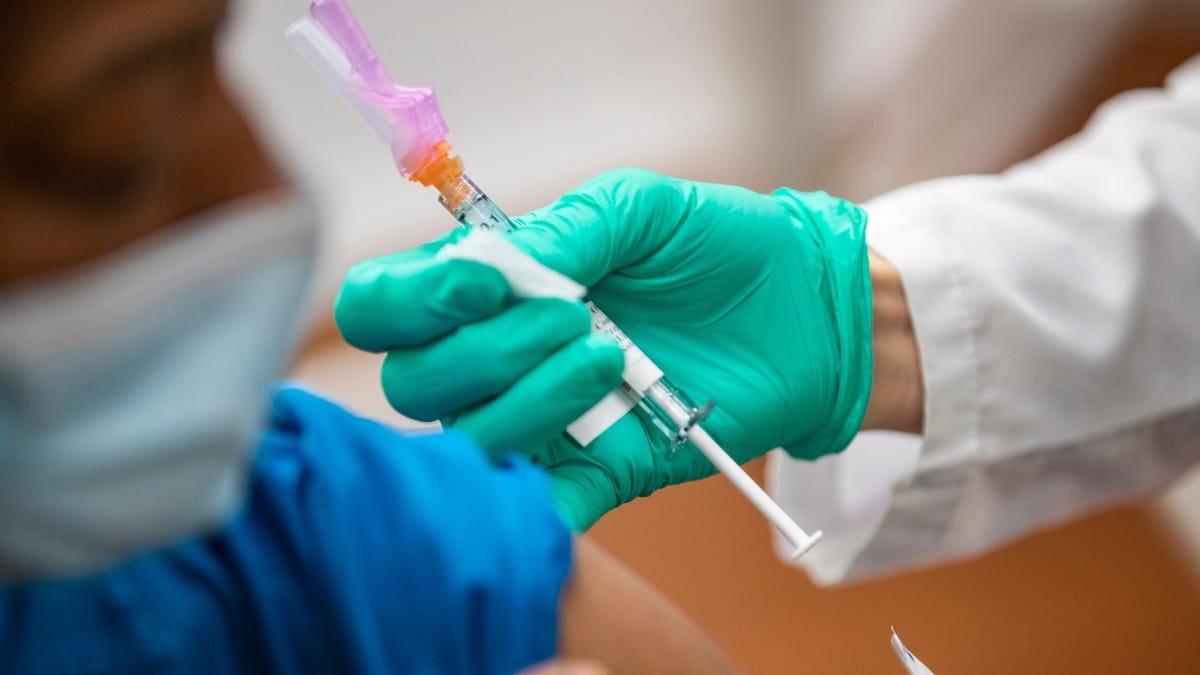COVID, RSV, flu: All the vaccines recommended for you this year
The summer activities are winding down, children are heading back to school, and the grocery stores are filled with everything pumpkin-flavored.
With the arrival of fall, we also see an increase in respiratory illnesses.
This fall and winter, however, will be different from previous years. Since the pandemic, health officials have introduced new vaccines aimed at reducing severe symptoms from COVID-19, respiratory syncytial virus (RSV), and the flu.
Experts recommend that those eligible should receive the vaccines as the respiratory virus season approaches. It’s also wise to stock up on home testing kits and over-the-counter medications and to create plans with healthcare providers for managing illness if it occurs.
“We have vaccines, testing, and treatments available for the illnesses that cause the majority of fall and winter hospitalizations and fatalities,” said Dr. Mandy Cohen, director of the Centers for Disease Control and Prevention, during an August press conference. “To prepare for this winter, it’s essential for everyone to stay alert and utilize these resources.”
Here’s what you need to know about the vaccines available for adults and the individuals eligible to receive them. For the latest information regarding vaccines for children, click here.
COVID vaccines: Pfizer, Moderna, Novavax
Updated COVID-19 vaccines are now widely available across the U.S. at healthcare facilities following FDA approval last week. Pharmacies like CVS and Walgreens are open for appointments and walk-in vaccinations.
The vaccines from Pfizer and Moderna are engineered to combat the KP.2 variant using messenger RNA (mRNA) technology.
In June, the CDC suggested these vaccines for anyone aged 6 months and older.
Health officials affirm that these new vaccines should effectively protect against the variants currently spreading in the U.S. As of Wednesday, the KP.3.1.1 subvariant accounted for almost 37% of COVID-19 cases, while KP.3 made up more than 16%, according to CDC statistics.
Novavax’s vaccine, which hasn’t been approved this year, utilizes a traditional protein-based approach against the JN.1 lineage, which should help trigger an immune response to circulating subvariants.
Novavax has stated that it anticipates its pre-filled syringes to be available “in time for peak vaccination season.”
Enhancing this season’s rollout
Experts are hoping that this year’s vaccine rollout will proceed without the issues faced last year, which was the first time COVID-19 vaccinations were distributed through commercial supply chains rather than the federal government. Various problems with wholesalers, distributors, pharmacies, and insurance companies delayed vaccinations significantly post-approval.
“Last year had many challenges to troubleshoot since it was the first time,” remarked Dr. Kisha Davis, chief health officer for Montgomery County, Maryland, and board member of the American Academy of Family Physicians. “Much of that has been resolved this year.”
Experts are also concerned about how uninsured or underinsured individuals will access COVID-19 vaccines since the Bridge Access program has ended. This $1.1 billion initiative provided 1.5 million free vaccinations since its introduction in September of the previous year, but funding ceased on August 31.
To address this gap, the CDC intends to distribute $62 million in “unused vaccine contract funds” to local and state health departments to offer updated vaccines for uninsured or underinsured people.
However, critics argue that this amount is insufficient, noted Chrissie Juliano, executive director of the Big Cities Health Coalition, which represents local health departments nationwide. There’s also a lack of transparency regarding how the funds will be allocated and how local and state health departments can utilize them.
“We are fundamentally lacking financial resources for inventory,” stated Crystal La Tour Rambaud, who leads the immunization program for the Pima County Health Department in Arizona. “Direct funding for inventory would be a significant relief.”
Is there an RSV vaccine?
For the second consecutive year, certain vaccines are now available for adults to safeguard against RSV.
Respiratory syncytial virus (RSV) is a common illness that most individuals will contract by the age of 2. It exhibits cold-like symptoms and affects the respiratory system, including the lungs, as per the CDC.
While RSV is the leading cause of hospital stays for infants and young children, it also presents risks later in life, leading to over 177,000 hospitalizations and 14,000 deaths annually among older adults.
This season, two vaccines have been approved for older adults: Arexvy from GSK and mRESVIA from Moderna. Notably, the Moderna vaccine is the first mRNA vaccine other than COVID-19 to receive approval in the U.S. Both are recommended for all individuals aged 75 and older, as well as adults aged 60 to 74 who are at a higher risk of severe disease.
Additionally, to shield newborns from severe respiratory infections, health authorities advise that pregnant individuals receive Pfizer’s maternal vaccine Abrysvo. This vaccine is approved for administration during the 32nd and 36th weeks of pregnancy during the RSV season, which usually runs from September to January in the U.S.
“This timing allows sufficient opportunity for antibody generation through the vaccine, which can then transfer through the placenta for the infant’s protection at birth,” explained Dr. Sterling Ransone, board chair of the American Academy of Family Physicians, in a previous interview.
Unlike the annual vaccines like those for COVID-19 or the flu, RSV vaccines are designed for a one-time administration. Eligible adults will only need this shot once in their lifetime.
Flu Shot: When Should You Get It?
With numerous new vaccines available, health experts are urging Americans to remember to get their yearly flu shot.
A CDC advisory committee has suggested that everyone aged 6 months and older should receive their seasonal flu vaccine. This vaccine specifically targets the three strains of influenza A that were prevalent last winter.
According to experts, adults should focus on preparation and prevention.
“Our primary advice for safeguarding yourself and your family from respiratory illnesses is to get vaccinated,” stated Dr. Mandy Cohen, CDC Director. “It’s important to plan ahead and ensure that you and your family receive both the updated flu vaccine and COVID vaccine this fall, before respiratory virus season begins.”

